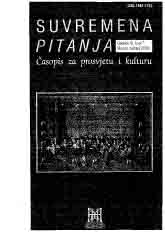HRVATSKI JEZIK U BOSNI I HERCEGOVINI S OBZIROM NA NJEGOV ZAKONSKI I STVARNI POLOŽAJ U DRUŠTVU
THE CROATIAN LANGUAGE IN BOSNIA AND HERZEGOVINA IN VIEW OF ITS LEGAL AND REAL POSITION IN SOCIETY
Author(s): Šimun MusaSubject(s): Language and Literature Studies
Published by: Matica hrvatska Mostar
Keywords: the Croatian language; language standard; language unitarianism; Bosnia and Herzegovina; dialect
Summary/Abstract: The Croatian language, observed in its entirety, owing to historical, sociological, geographical, demographic, economic and other reasons, has a special course and very stratified structure. This has been manifested since its early period (the period of the Baška and Humac Stone Tablets of the 12th century), when it was developing into a language of literacy and literary beginning, emergence of regional literatures when the Croatian language appeared in three different dialects, through a certain standardization of the Croatian language in the 18th and 19th century which was dominated by the new štokavian dialect and ikavian-jekavian pronunciation of the letter yat, which was mostly the merit of Franciscans from the Silver Bosnia. The lllyrian Revival Period provided a special contribution to the process of Croatian langugage standardization. That period was marked by conflicts between different philological schools. At the turn of the 20th century, however, one of those schools, the Croatian vukovci (followers of Vuk Karadžic}, won«. The Croatian vukovci dominated during most of the 20th century, advocating some kind of unitarism, except during the rule of the Independent State of Croatia, when the standardization strategy tended towards exclusivity. Post-WWII Yugoslavia was also full of the unitarianist-repressive measures in the implementation of language standardization, all under the pretence of "language tolerance«, and especially in Bosnia and Herzegovina, where "a unique Bosnian-Herzegovinian standard form of linguistic expression" should have been constituted and adopted. However, in spite of all those prohibitions, threats, punishments and every tempora! temptation, the Croatian language survived as an independent, standardized language. Today it is both constitutionally and legally equal with other languages in Bosnia and Herzegovina. Regardless of the dis harmony of its constitutional-legal solutions and practical realizations, it will survive all the current traps, pressures, injustices and temptations, and it will continue to be the unique language of the Croatian people in Bosnia and Herzegovina and the world.
Journal: Suvremena pitanja
- Issue Year: 2009
- Issue No: 7
- Page Range: 1-26
- Page Count: 26
- Language: Croatian

